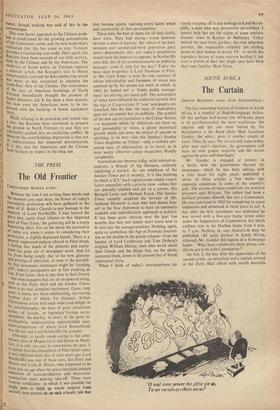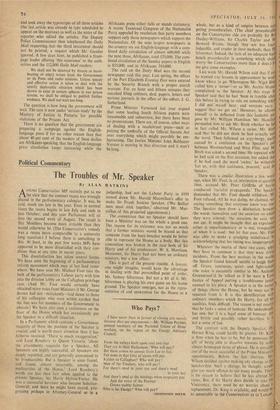SOUTH AFRICA
The Curtain
ARNOLD BE1CHMAN writes from Johannesburg: The last remaining bastion of freedom in South Africa is a handful of English-language dailies. Of this perhaps half-dozen (the Afrikaans press is all pro-Nationalist) the most vociferous the angriest and the one most feared by the Nationalists is the Rand Daily Mail. Laurence Gandar, the edito:, gives it another couple of years. Then, he says, 'the curtain will come do‘vrt: after next year's elections, the government will have an even greater majority and the moves against the press will then begin.'
Mr. Gandar is engaged at present in a' battle with the government because his newspaper, which he has been editing with a free hand for eight years, published a series of three articles a few weeks ago exposing conditions in some of the country's jails. The victims of these conditions are political prisoners and Africans. The author had been a political prisoner himself, but not a Communist. He was convicted in 1962 for conspiring to cause explosions and sentenced to three years in jail. A day after the first instalment was published he was served with a five-year house arrest order under the Suppression of Communism Act which confines him to his Durban home from 6 p.m. to 7 a.m. Nothing he says henceforth may be published. All quite normal in South Africa,. although Mr. Gandar did inquire in a front-page leader: 'What have complaints about prison con- ditions got to do with Communism?'
. On July 2, the day after the appearance of the second article, six detectives and a captain arrived at the Daily Mai/ offices with search warrants
'0 wad some power the giftie gie us, To see oursels as others see us!'
and took away the typescripts of all three articles (the last article was already in type scheduled to appear on the morrow) as well as the notes of the reporter who edited the articles. The Deputy Police Commissioner then telephoned the Daily Mail requesting that the third instalment should not be printed, a request which Mr. Gandar ignored. A few days later, he published a front- page leader offering 'this assurance' to the auth- orities and the 112,000 Daily Mail readers :
We shall not be deterred by threats or brow- beating or angry noises from the Government or its Press and radio minions. Unless speedy and effective action is taken to deal with the utterly deplorable situation which has been shown to exist in certain spheres in our prison system, we shall be obliged to publish further evidence. We shall not wait too long.
The question is how long the government will wait. The case is now under `serious study' by the Ministry of Justice in Pretoria for possible violations of the Prisons Act.
• There is no question that the government are preparing a campaign against the English- language press if for no other reason than that about 40 per cent of the readers of these dailies are Afrikaans-speaking, that the English-language press circulation keeps increasing while the Afrikaans press either falls or stands stationary. A recent Transvaal Congress of the Nationalist Party appealed by resolution that party members support only those newspapers which support the Nationalists. Of the nine largest newspapers in the country six are English-language with a com- bined daily circulation of almost 600,000 while the next three, Afrikaans, total 135,000. The com- bined circulation of the Sunday papers in English is 855,000, and in Afrikaans 310,000.
The raid on the Daily Mail was the second newspaper raid this year. Last spring, the offices of the Port Elizabeth Evening Post were entered by the Security Branch with a proper search warrant. For an hour and fifteen minutes they searched filing cabinets, desk papers, letters and various journals in the office of the editor, J. G. Sutherland.
Prime Minister Vcrwoerd last year argued that some leading South African papers were treasonable and subversive, but there have been no prosecutions. There are, of course, other ways of dealing with a recalcitrant press—such as putting the umbrella of the Official Secrets Act over everything which might possibly be em- barrassing. Tbe Justice Minister John Balthazar Vorster is moving in that direction and it won't be long.

















 Previous page
Previous page